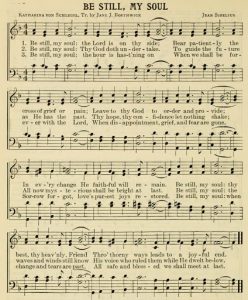


Kathrina von Schlegel (b. 1697)
Repertoire:
Be Still, My Soul
Psalm 46:10
Be still, and know that I am God: I will be exalted among the heathen, I will be exalted in the earth.
We know that the world is going through a time of unrest. Neighbors against neighbors, friends against friends, and unfortunately, sometimes family against family. I think history shows that if The Lord tarries, it will not be the last. Sometimes, when this happens in the physical family or with our children, someone will try to take us aside and offer counsel, and offer to sit, to talk, to listen, and to help work the relationship back to where it needs to be which we can accept or reject. Sometimes, it is just a simple “settle down”, in order to begin to listen and understand. The Bible has its own version of “settle down!” It’s the phrase “Be still!” The Bible is full of these hard to understand and difficult to deal with phrases. People may ask, “just what does it mean?” Maybe, just settle down, sit down, and listen?
Along with everyone else, I have been thinking about the current situation in the world and this beautiful hymn came to mind. It contains some wonderful thoughts teamed with a fantastic melody and it took four people, unknown to each other and in different countries, to bring this wonderful hymn to life over a period of about 300 years.
First is Kathrina von Schlegel. Little is known of this lady. According to various sources she was born October 22, 1697 in Köthen, Germany. What is known is that she lived in a Lutheran Damenstift, a residential area for unmarried Protestant women. This was not an unusual arrangement during this time. Most of the ladies in these lodgings belonged to the nobility and enjoyed extensive freedom in their life. Like many in that time, Kathrina’s spiritual life was influenced by the Pietist movement. This was a group that believed that renewal would come through the study and preaching of God’s Word, the exercise of the priesthood of all believers, and they emphasized practical Christianity lived out in daily life. The Pietists also believed in the importance of congregational hymn singing and Kathrina spent much of her time writing hymns. The only one which has passed into English is Be Still, My Soul!
Next is Jane Borthwick who gave us the first English translation of our song about a century later. Her father, James Borthwick, was manager of the North British Insurance Office, in Edinburgh, Scotland. She was born in that city, April 1813. She was one of the leading translators of German hymns into English. Along with her sister Sarah, she translated many hymns into English from the German Hymns from the Land of Luther, first published in 1854. “Be Still My Soul” comes from the 1855 edition.
Finnish composer Jean Sibelius (1865 – 1957) is the third in line of this hymn’s history. His composition Finlandia had its origins as a form of political protest. It was written for the Finnish Press Pension Celebration (1899). This was a rally in support of freedom of the Finnish press, then largely controlled by Tsarist Russia. It became popular during this time and in 1900, Sibelius arranged Finlandia for solo piano.
Last, and certainly not least, is David Evans (1874-1948), an Oxford-trained organist-choirmaster and music professor. He was the person who brought all the individual pieces together, matching the translation with the 1900 piano tune for the “Revised Church Hymnary” (London, 1927). This hymn was then brought to the United States when it was used by the Presbyterian Church, U.S.A. for “The Hymnal” (1933).
So why does God command us in Psalm 46 to “be still”? Not just simply be quiet, but relax, calm down, be still! How can we be still at such a time? Miss von Schlegel suggests many reasons why we should be still and trust God.
“Be still, my soul, the Lord is on thy side. Bear patiently the cross of grief or pain;”
In stanza 1 the most important reason for our stillness is that the Lord is on our side. If God be for us, who can be against us? It is because the Lord is on our side that we should be able to bear patiently whatever cross of grief or pain that we have. He will always be faithful and since we know that the Lord is faithful, we should be patient to let Him fulfill His promise of a joyful end.
“Be still, my soul, thy God doth undertake to guide the future as He has the past.”
In stanza 2, it states that we should be still because God is our guide. Because of this, we can trust the future to Him and not worry about it. We should let nothing shake our confidence in Him because He has promised us strength, guidance, and protection.
“Be still, my soul: When dearest friends depart, and all is darkened in the vale of tears,”
Stanza 3 tells us we should be still in times of trial because He is The Comforter through all that we might face. And it is promised that all that we lose or suffer will be repaid! Through all the trials we might have to endure, the Lord has promised His protection and comfort up to and including the time of death. He offers comfort to soothe away our sorrows and fears. Knowing that God has promised to repay anything that is taken away, we can always look to Him to renew our strength for our trials.
“Be still, my soul; the hour is hastening on When we shall be forever with the Lord;”
Stanza 4 reminds us that we should be still and stay focused because time is quickly passing by. When it is over, we shall be forever with Him. Whether we die first or are alive when the Lord returns, the hour is hastening when we shall be with the Lord. As Christians, we can look forward to that time when disappointment, grief, fear, and sorrow will all be forgotten. But even more importantly, we can look forward to that time when we shall meet Him at last.
“Be still, my soul: begin the song of praise on earth, believing, to Thy Lord on high;
Stanza 5 gives us the assurance that what we begin on earth will continue through eternity! Through faith, we begin our song of praise to the Lord while on earth. The promise is made that this faithfulness will be more brightly known through eternity.
I believe that part of the popularity of this song may be due in part to the beautiful melody to which it is sung. The talents of these people from different countries over a period of 300 years have produced a hymn that teaches us so well some Biblical principles that we need in our hectic daily lives. But mostly, I believe it remains popular due to the fact that every day, I need to remember that no matter what problems and difficulties I might face, the Lord is on my side, to guide, comfort, and preserve me. And with this knowledge, I should always be able to say to myself, “Be Still, My Soul.”
Source:
Annotations of the Hymnal, Charles Hutchins, M.A. 1872.
Dictionary of Hymnology, John Julian, 1907
Finlandia, Betsy Schwarm, Encyclopedia Britannica, 2016
www.Wordwise Hymns.com
